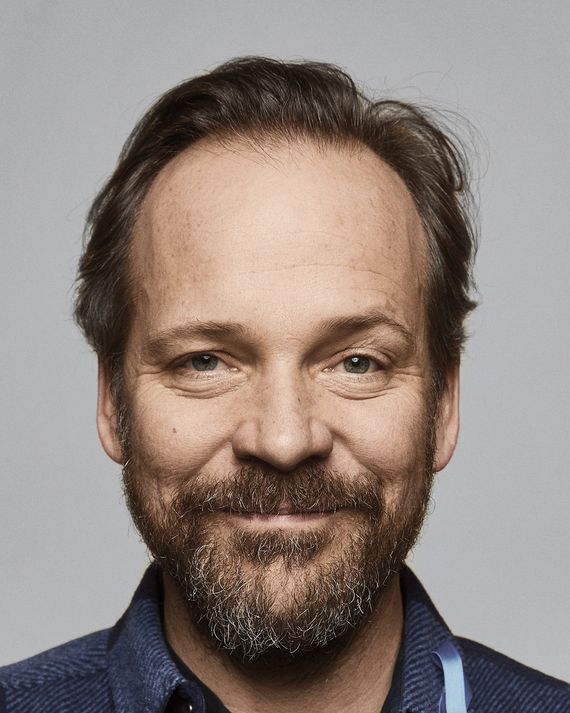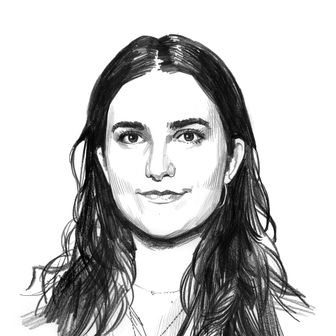
Peter Sarsgaard is sitting across from me, spoiling the ending of Lolita. It’s early December, and we’re at Rucola, an Italian spot in Boerum Hill that he frequents, and the conversation has turned to Vladimir Nabokov, whose work I’ve somehow never read. But that possibility doesn’t seem to cross Sarsgaard’s mind when he starts to describe one of the novel’s final scenes, in which the protagonist, Humbert Humbert, corners Clare Quilty, who, like Humbert, is obsessed with 12-year-old Lolita. “He shoots him and he shoots him. Then he goes up the stairs, and he shoots and shoots and shoots,” Sarsgaard says as I nod along. “The amount of anger that Humbert has for a guy doing the same thing that he does, it’s like he’s killing himself. It’s almost comedic. Such a clever book.”
When Sarsgaard talks about books — which he does often over the course of our lunch — he speaks with genuine awe. These are apt digressions given Sarsgaard’s newest role as Professor Hardy, a hotshot academic, in his wife Maggie Gyllenhaal’s feature directorial debut, The Lost Daughter. The movie, adapted from a novel by Elena Ferrante, centers on Leda, a divorced middle-aged professor vacationing alone on a Greek island who meets a younger mother named Nina. Nina and her daughter trigger Leda’s memories of her own early motherhood, and those sequences run parallel to the story unfolding in the present day: The younger Leda is a brilliant, ambitious scholar suffocating under domesticity’s demands until she meets the renowned Professor Hardy at a conference. In a film about the unspeakable aspects of motherhood, Sarsgaard’s role is small but pivotal: By seducing Leda, he catalyzes her to act upon her most selfish and least maternal desires.
As an actor, Sarsgaard is a chameleon: His breakout role was as a murderer in Boys Don’t Cry, and he has played everything from a stoner gravedigger in cult classic Garden State to an eccentric scientist in Green Lantern. To prepare for the role of Professor Hardy, Sarsgaard read close to 800 pages a day, he estimates, in an attempt to get in touch with his academic side. On Spetses, the austere Greek island where The Lost Daughter was filmed, he read The Magus, a 700-page tome by John Fowles; and Anna Karenina; and almost all of Nabokov’s work. He listened to the lectures of “iconic rock-star intellectuals” like Nabokov and Jorge Luis Borges and Kurt Vonnegut, studying the way they spoke to their audiences about literature.
In The Lost Daughter, the seed of the attraction between Hardy and Leda is planted during a lecture he gives on W. H. Auden. Sarsgaard’s character addresses the packed room, projecting electricity and gentle charisma. But the effect, Sarsgaard admits, can be only partially attributed to his preparation. “You have your wife adoring you and filming you a certain way,” he says. “If the person making it in the camera adores you, then the audience will adore you.”
Sarsgaard met Gyllenhaal at a dinner about 20 years ago. Their first encounter was not unlike that between Leda and Professor Hardy: “We just hit it off,” Sarsgaard says. “Not just artistically but in terms of our minds.” The two have been partners creatively as well as romantically ever since. When, during the pandemic, Gyllenhaal directed her first short film, Sarsgaard starred in it (the role involved making love to a tree). And as she wrote the script for The Lost Daughter, he acted as a sounding board, avoiding reading the novel so he could come to it fresh. His role as Professor Hardy meant Gyllenhaal had to again direct him in sex scenes, and when I wonder if that was weird at all, he matter-of-factly explains it was quite the opposite. “She was really focused on the action of the scene — making it look a certain way,” Sarsgaard says. “I felt less nervous than I normally would. I’ve joked, ‘Everyone should do this with their wives.’ ”
He has a fascination with husband-wife literary pairs. One of the reasons Sarsgaard is so drawn to Nabokov is that he worked closely with his wife, Véra, on all of his books, including Lolita. “I was interested in him as this guy who’d written this dirty book with his wife. She even encouraged him to write it,” he says, referencing the moment Vladimir tried to burn the manuscript and Véra saved it. Another literary wife guy Sarsgaard cites is Norman Rush, whose wife, Elsa, served as both an editor and a muse for the novel Mating, about an anthropologist who stumbles upon an all-female society founded by a charismatic man. “Elsa is all over that book,” he says. “His name should be on the cover as the guy who wrote it, but you can feel that the book wouldn’t have been what it is without her.” The same, he says, is true of him and Gyllenhaal: “We are so entwined in everything the other person does. We know what scene the other person is shooting on a given day, even if they’re far away.”
This line of literary couples is interesting to consider in the context of The Lost Daughter, which is so much about how the conditions of womanhood stamp out the possibilities of creative production, how Leda’s talents and desires are subsumed into the act of being a wife and mother. Véra Nabokov and Elsa Rush fall into a tradition of wives who functioned as their husband’s typists, readers, muses, or silent partners but who, unlike their spouses, have not become literary household names. But perhaps the Sarsgaard-Gyllenhaal partnership is a pleasing inverse: the husband who will allow himself to be molded in service of his wife’s vision and then stand back and let her do her thing. “We always know that ‘this is mine and that is yours,’ ” Sarsgaard clarifies. “I don’t have any ownership over The Lost Daughter other than my little part.” In the film, characters like Leda make mysterious decisions that are never explained or rationalized; many of Sarsgaard’s suggestions were about adding plot points to further the narrative propulsion and make the characters’ motivations clearer — which Gyllenhaal refused. “I kept wanting her to turn the screw tighter for the plot,” Sarsgaard says. “This might be a masculine thing.”
Sarsgaard freely admits that between him and Gyllenhaal, she is the more prolific one. For years, Gyllenhaal had wanted to adapt The Days of Abandonment, another early Ferrante novel. The book’s rights were caught up in legal issues, but when she was offered The Lost Daughter, “she started working on it and wrote it so quickly,” Sarsgaard says. He also considers himself a writer, but his process is much more laborious; he’ll start things and abandon them halfway through, or he’ll spend an afternoon stuck on a word. “I was writing something at that time, and I remember thinking, Oh my God, I’ve written an eighth of what I wanted to write.” He still hasn’t finished it.
These days, Sarsgaard pours as much obsessiveness into his hobbies as he does into his roles. Those hobbies are basically as Early 2000s Brooklyn Dad as one can get. (He and Gyllenhaal have two children, ages 9 and 15.) He keeps bees, both on the roof of the family’s Brooklyn apartment and at their Vermont home, where he has a small orchard. He grows apples, pears, cherries, apricots, and plums as well as lingonberries, cranberries, blueberries, raspberries, and strawberries. “I go very deep with this stuff,” he says, before launching into an explanation of the difference between mason bees and honeybees.
Soon, Sarsgaard is gathering his tote and fetching his dog, a wirehaired pointer that has been waiting patiently outside the restaurant. He plans to spend the afternoon digging into a new project. “I’m writing something for Maggie to act in and another project for us to do together,” he says. “She’s helping me with it.”





